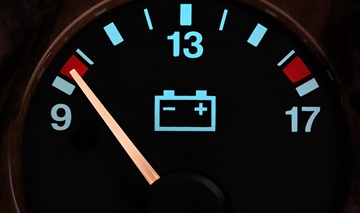Cómo saber si la batería automotriz está agotada o se está por agotar
The most obvious sign of a bad battery is that your car won't start, but what about before that?
If you know what to look for, your car might be showing signs that your battery is dying.
1. Battery Voltage Less Than 14V With the Car Running
Here’s one more obvious sign your car battery is dying: a battery warning light.
The battery warning light generally refers to voltage. If your vehicle’s model year is 2012-2014 or younger, you might even be able to see the voltage on your dashboard.
A 12-volt car battery should have 14 volts when the car is running. If your engine is running, your car battery voltage could be between 13 volts and 15 volts — but less than 16 volts. (Anything more than 16 volts can damage your car’s electronics.)
However, voltage isn't a sign of how much longer you can trust your battery. It’s just showing how much power your battery has right now. So your battery could be drained.
How can you really tell if a battery is dying?
Check before it actually dies. Visit any place Interstate® is sold, and let the pros give you a fast, accurate battery test.
If you recharge the battery, it could be fine. If your battery still dies right after, then the battery can’t hold a charge for long. At that point, you need to replace the battery.
2. Flickering Headlights With the Engine Off
As soon as you get in the car, turn on the headlights. If the headlights flicker within 60 seconds, you may need a new car battery.
One of the easiest ways to tell if your car battery is dying is by watching the headlights in a dark garage. This only works if you haven’t been driving in the last several hours because your alternator will recharge the battery during the drive. It might not be a significant recharge, but it’s enough to reinvigorate the battery.
Also, this only works with regular flooded batteries, not AGM batteries. AGM batteries are designed to handle heavy electrical loads and start the ignition, like in a stop-start engine. If you test a regular car battery’s strength this way too often, you will kill it. Regular batteries are designed to deliver a lot of power all at once and not to keep the lights on.
Now, if the car is running and the headlights flicker while you’re idling at a stoplight, that may be a sign of a bad alternator and a weak battery. Normally, if an alternator can’t deliver enough power to run everything the car needs, the battery picks up the slack. However, a bad alternator will eventually kill a battery. When that happens, you’ll notice a lot of engine issues while the car is running.
3. Glitching Electronics, Such as the Radio, Windows or Sensors
Watch for electronic glitches like a window that hesitates before rolling down, a flickering cabin light or even the computer forgetting your Bluetooth connection or favorite radio station.
It may seem like a minor inconvenience. It may also be a cry for help.
When you get a jump, you need a new battery.
Is it time for a fresh start? Visit an Interstate All Battery Center for a free battery test to find out.
Your car battery powers everything when the engine’s off, including the computers and memory cards in your vehicle. If your car forgets a Bluetooth setting when you get in the car, that could mean the battery drained too low to keep power to a specific module. Losing power in this small way can seem like a first world problem, but it’s actually a sign that the battery didn’t have enough voltage to power everything it is supposed to.
Your vehicle is designed with specific demands, and the battery is powered to match. If it can’t meet that demand, no matter how small, that’s a sign that the battery is getting weak.
4. Rough Idling as Soon as the Engine Starts
You know how your car is supposed to sound. You know what to expect. “Trust your hearing, Luke,” to paraphrase Obi-Wan Kenobi.
If you start the car and you feel hitches or jolts from the engine that fade away after a minute or two, then you might have a dead battery. They’re small, slight irregularities that go away after a minute — but they’re trying to warn you of a dying battery.
Here’s why. Your car draws power, usually from the alternator, to measure oxygen and fuel. In the first few seconds, though, your alternator's barely gotten going. That’s when the battery steps in, supplying electricity to engine sensors, control modules and switches. This works all within the first five minutes of running your engine. Eventually, the alternator picks up RPM and takes over the electrical duties.
However, if your battery is weak, you’ll feel small hitches or jolts in the engine from sensors that didn’t get enough power or from switches not fully activated. (If your battery is extremely drained, the car might display a check engine light or other warning light because a sensor didn’t get enough power.)
Ordinarily, this difference is subtle. If you’re paying attention to the way your car feels, you’ll notice it. If you can feel a slight pause that only lasts a quarter of a second, go get a battery test.
It might be a sign your battery is dying.
Ask for a free battery test at any of these 150.000 locations.
Where can you get a free battery test? Put in your city or ZIP code, and we'll show you dozens of locations nearby. También puede buscar nuestro logotipo en cualquiera de los talleres de automóviles de su zona.
5. Temperature Sensitivity: Hesitating Ignition on Cold Nights (But Fine During the Day)
Temperature sensitivity is a sign your car battery is dying. Weak batteries don't do cold. They can handle warm temperatures until they get so weak they flat out die, but low temperatures are the real battery killer.
This goes back to chemistry 101: Low temperatures slow down chemical reactions, and your car battery is a big electrochemical reaction waiting to happen. If the temperature drops a few degrees at night, your car battery will notice it, even if you don’t.
A healthy car battery can withstand those temperature drops. Each car battery’s strength is measured in CCA, as in how much power is a battery supposed to give at zero degrees Fahrenheit (-17 degrees Celsius.) A new car battery is tested and designed to crank your car when it’s colder than 30 degrees below freezing. That’s real cold. In fact, if a car battery can’t deliver the amps your car needs at zero degrees outside, then technicians would say it’s performing below the required specifications.
So, if the temperature drops just five degrees at night and your ignition doesn’t start within 30 seconds, pay attention. You might be seeing the first sign that your battery is dying.
6. Battery Dead Right After Recharging It
If you’ve recharged the battery (or taken it on a long road trip) and the ignition still hesitates or the battery shows signs of weakening, then the battery is dead or dying.
If a battery gets so weak that it can’t hold power, then recharging it won’t do any good. If you think about it, you’ve probably had this issue with a phone battery, too. Technicians and mechanics use the phrase “hammer dead” to describe this condition. Hammer dead is different from a dead battery that you can recharge. Technicians would call that just a flat battery; it sounds British, but it means there’s not any power in the battery. Recharge a flat battery, and it might serve you a couple more years.
Try to recharge a hammer dead battery and you might energize it enough to pretend like a healthy battery for a short period of time.
Dead batteries can surprise you any time.
Instead, get a battery test, available wherever Interstate is sold, to replace batteries before they die. You may never need a jump again.
Even if your battery does start the engine, it might be because the weather is warm enough that starting the car is easy for a battery. However, if a battery has lost capacity like this, then it won’t start the engine if the temperature drops a few degrees or if it’s gone too long without recharging from the alternator.
7. Everything Feeling Fine After Driving
Your car should operate optimally as soon as the ignition starts. However, if you feel like your car works better after driving for a while, everything is not fine.
If your car works better after driving, then you’ve got a good alternator keeping a weak battery going.
Car electronics are run mostly on the alternator, especially after you’ve been driving for 20-30 minutes. Before that, if things feel glitchy or rough, it’s because your battery isn’t helping much. When the alternator's not spinning fast (like when the engine's RPM are low), the battery's supposed to step in and power the electronics. If things even out only when the alternator's running hard, your car battery is losing strength.
That means it’s time to get a battery test to see if you can replace a bad battery before it fails.
Why It’s Hard to Tell If a Car Battery Is Dying
These warning signs can be as subtle as a whisper.
Batteries can appear to die suddenly because today's engines are more sophisticated than they were 30 years ago. They're smaller, lighter and easier to start than your grandparents' cars were back in the day. Today's cars can compensate for a dying battery (but not fully recharge it.) On one hand, that compensation is good news. The newer your vehicle is, the better the electrical system is at getting the most years out of every car battery.
It also means that when your battery dies, it doesn’t give you much warning. That is, unless you know these signs of a dying car battery.
If you notice these little signs, it's a safe guess that your battery's dying. Why guess at all? As long as you regularly get a battery test with every oil change, you’ll stay ahead of any battery-related problems. Now, a dead battery can be a sign of a deeper issue. The alternator, the starter or the cables could be failing. It might be time to ask a qualified professional.
Not sure where to look? We can recommend a few good shops to ask for your battery test. Of course, you can also get a battery test at an Interstate All Battery Center near you.
There's a repair shop near you. Let's find one now.
Interstate Batteries has a network of more than 150.000 auto repair shops, garages and more. One of them is nearby right now, ready to help you.




